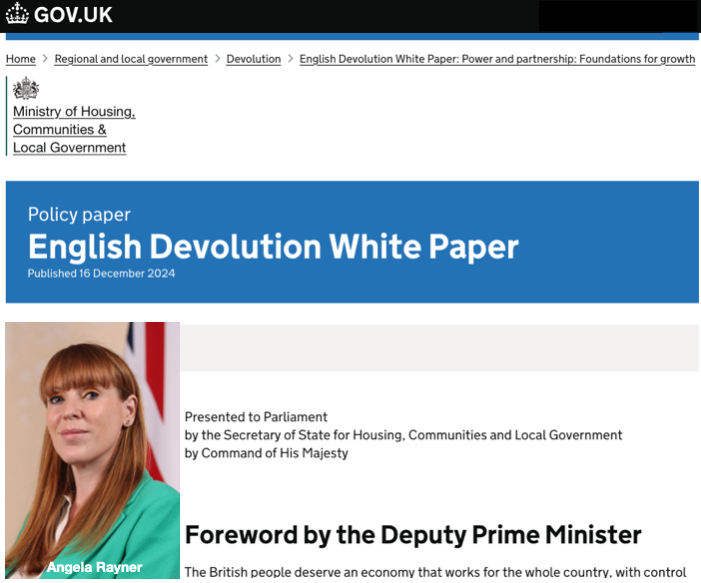 Abraham Lincoln
If given the truth, the people can be depended upon to meet any national crisis...
Abraham Lincoln
If given the truth, the people can be depended upon to meet any national crisis...
 Guildford news...
for Guildford people, brought to you by Guildford reporters - Guildford's own news service
Guildford news...
for Guildford people, brought to you by Guildford reporters - Guildford's own news service
Two Unitary Authorities, One Elected Mayor – Most Likely Devolution Outcome for Surrey
Published on: 20 Dec, 2024
Updated on: 20 Dec, 2024
local democracy reporter
Surrey could be split in two as part of sweeping changes to how services are run. Downing Street is looking to reshape local government and has set out a white paper outlining its vision.
It wants to do away with two-tier systems of boroughs and counties and instead create single unitary councils. It argues this would not only be more cost-effective but also shift power away from Westminster.
If devolution plans for the county go through, Surrey and its 11 boroughs and districts would be no more. The big question is what they will be replaced by? The most likely answer at the moment appears to be two “unitary authorities” with a directly elected mayor overseeing county-wide issues – these could include policing, fire and rescue and transport.
The English Devolution White Paper says that new unitary councils “must be the right size to achieve efficiencies, improve capacity and withstand financial shocks.”
“For most areas this will mean creating councils with a population of 500,000 or more, but there may be exceptions to ensure new structures make sense for an area, including for devolution, and decisions will be on a case-by-case basis.”
Surrey has a population of 1.2 million and a single “mega-council” stretching from Farnham to Oxted, an area larger than Greater London, would simply be too vast, some have argued.
This leaves the most likely option of merging the current boroughs of Tandridge, Mole Valley, Reigate & Banstead, and Epsom & Ewell, into East Surrey Council with Woking, Guildford, Spelthorne, Runnymede, Surrey Heath, Waverley and Elmbridge, forming West Surrey Council.
The white paper argues: “Unitary councils can lead to better outcomes for residents, save significant money which can be reinvested in public services, and improve accountability with fewer politicians who are more able to focus on delivering for residents.”
Those against it argue devolution could push residents further from the decision-making process, and only delay funding reforms for local government.
Will Forster, newly elected MP for Woking, said: “I don’t think that having a single mega council is a good idea.
“Camberley to Oxted is far too large, there are huge differences east to west. It’s too large and remote. A single council would be too vast.
“That’s not devolution, that’s not empowering people.”
Even the idea of a West Surrey Council would create a single area stretching from Haslemere to Staines.
It also, he said, “ignores the elephant in the room, social care – this seems to be the Government’s way of ignoring that.”
Mr Forster said: “They want authorities of 500,000 or more. You look at a map, you do the sums. That’s clearly an east-west split.
“They’ve never divided up a borough or district and you can’t do north or south.”
Other questions would need to be answered as well, such as how the directly elected mayors are held to account.
At county level, SCC currently holds regular meetings to vote on decisions with scrutiny committees playing a further role. How this would be replicated for a single mayor is yet to be made clear.
Councils have been invited to submit proposals to the government in January.
Tim Oliver, leader of Surrey County Council, said they welcomed the devolution paper and its “bold ambition to empower local communities and councils”.
He said: “The government has set out an agenda for change, including potential reorganisation of local government, particularly in two-tier county areas like Surrey.
“I believe there is general consensus that the current structure – here and elsewhere in the country – is not the most effective.
“Therefore, we welcome a real examination and review of how local government is organised to make it more efficient and more effective for residents.
“We intend to work alongside government, and other partners locally, and ensure any change ultimately benefits the people of Surrey.”
Announcing the paper’s publication, deputy prime minister Angela Rayner said: “Our manifesto pledged to give everyone access to devolved power.
“So I will legislate for a new power of ministerial directive – which will allow central government to knock heads together and create strategic authorities when local leaders cannot agree.
“If we are going to build an economy that works for everyone, we need nothing less than a completely new way of governing – a generational project of determined devolution.
“Because the Westminster system is part of the problem. Whitehall is full of layers of governance and bureaucracy, controlled and micromanaged from the centre.
“To truly get growth in every corner of the country and put more money into people’s pockets, we must rewire England and end the hoarding in Whitehall by devolving power and money from central government to those with skin in the game.”
Responses to Two Unitary Authorities, One Elected Mayor – Most Likely Devolution Outcome for Surrey
Leave a Comment Cancel reply
Please see our comments policy. All comments are moderated and may take time to appear. Full names, or at least initial and surname, must be given.
Click on cartoon for Dragon story: Public Asked for Views on SCC’s Proposal for Reduced Speed Limits


Recent Articles
- Residents Urged to Have Their Say on the Changing Shape of Surrey’s Local Government
- Driver Given a Suspended Sentence After Head-on Collision With Motorcycle
- Birdwatcher’s Diary No.329
- Opinion: We Must Plan To Deal with Guildford Gridlock
- A281 Closure – Further Delay to Re-opening
- Centenary of Wood Street’s First Place of Worship, my Baptism Link with It and the Revd Deedes and his Family
- Care For Guildford Asks: Could You Be One Of Our Volunteers?
- Flashback: There Are Lessons To Learn from the Juneja Case – The Council Must Admit It
- GBC’s Plan For a Thriving Guildford ‘Is Our Promise to Residents’ Says Council Leader
- Highways Bulletin: Campaign for Better Transport


Recent Comments
- Richard Benson on GBC’s Plan For a Thriving Guildford ‘Is Our Promise to Residents’ Says Council Leader
- Nigel Base on Letter: Recreational Rowing Might Be the Answer
- Anna Windebank on GBC’s Plan For a Thriving Guildford ‘Is Our Promise to Residents’ Says Council Leader
- Caroline Turnbull on Letter: Recreational Rowing Might Be the Answer
- Caroline Freeman on Letter: Recreational Rowing Might Be the Answer
- David Roberts on Letter: Recreational Rowing Might Be the Answer
Search in Site
Media Gallery
Dragon Interview: Local Artist Leaves Her Mark At One of England’s Most Historic Buildings
January 21, 2023 / No Comment / Read MoreDragon Interview: Lib Dem Planning Chair: ‘Current Policy Doesn’t Work for Local People’
January 19, 2023 / No Comment / Read MoreA3 Tunnel in Guildford ‘Necessary’ for New Homes, Says Guildford’s MP
January 10, 2023 / No Comment / Read More‘Madness’ for London Road Scheme to Go Ahead Against ‘Huge Opposition’, Says SCC Leader
January 6, 2023 / No Comment / Read MoreCouncillor’s Son Starts Campaign for More Consultation on North Street Plan
December 30, 2022 / No Comment / Read MoreCounty Council Climbs Down Over London Road Works – Further ‘Engagement’ Period Announced
December 14, 2022 / No Comment / Read MoreDragon Interview: GBC Reaction to the Government’s Expected Decision to Relax Housing Targets
December 7, 2022 / No Comment / Read MoreHow Can Our Town Centre Businesses Recover? Watch the Shop Front Debate
May 18, 2020 / No Comment / Read More









Nigel Keane
December 21, 2024 at 2:04 am
The real elephant in the room is that Woking and Spelthorne both have massive debts. Unless these are written off by the government before this forced marriage it means those of us that live in more prudent district council areas would be unfairly penalised on our rates.
Why is it that Labour want to change so much about our lives when they never manage to balance the books of the country?
John Perkins
December 21, 2024 at 4:07 pm
There must be a suspicion that they want to avoid the embarrassment of a wipe out in the May elections.
In addition, the regions loosely match those that the EU imposed prior to Brexit. The leaders of the Labour party are mostly avid fans of rejoining, with Kier Starmer himself actively trying to prevent the UK leaving following the referendum.
Danny Steele
December 23, 2024 at 9:38 am
Those regions “that the EU imposed” were actually a British invention. In 1946, nine “standard regions” were proposed. Similar “provinces” in broadly the same boundaries with devolved government powers were floated in the 1974 Redcliffe-Maude report for local government reform.
The modern regions were formally introduced in current legislation in 1994 under the Major government, to ensure that all government statistical bodies were using the same region boundaries in order to make comparisons possible (else it was a nightmare where everyone had a different definition of e.g. “South East England”). It then also made sense for the UK government to use these same statistical regions, so that both international and European statistical bodies are also using the same boundaries, again to make comparison easier.
In fact, as far back as 1912, Winston Churchill, as First Lord of the Admiralty, proposed “Home Rule All Round” and a series of ten devolved parliaments that bear a remarkable similarity to the modern regions!
So, nothing to do with the EU whatsoever. The UK government of the time decided the regions would make sensible boundaries for MEP seats, but there was nothing to stop them using smaller constituencies, or even having no constituency and just having a nation-wide single election like France did.
John Perkins
December 25, 2024 at 1:36 pm
“Nothing to do with the EU whatsoever”. Just a coincidence then that the EU came into being at the beginning of 1994 and that Prime Minister John Major was enthusiastically committed to the EU.
The fact that changes had been proposed several times over the previous century does not necessarily mean the UK would have a devolved parliament or any form of “Home Rule”.
Statistical convenience is not a good reason for making constitutional changes.
Paul Kennedy
December 23, 2024 at 11:21 am
I really don’t buy this Daily Mail-style characterisation of the Government’s devolution agenda as an EU plot or an attempt to avoid an electoral wipeout for Labour.
The latest proposals are simply a re-energisation of the previous pro-Brexit Conservative government’s drive to replace local councils with remote and unaccountable mega-unitaries and regional mayors – as illustrated by Surrey County Council’s failed bid for a Surrey-wide unitary authority back in 2020.
And if Labour were really trying to avoid an electoral wipeout in next year’s elections why target county councils in the shires which are mostly still Conservative controlled? Labour only have two councillors on Surrey County Council.
The only beneficiaries of cancelling next year’s county council elections will be the demoralised Conservatives who are anxious to avoid a repeat of the wipeout they suffered in the borough and district elections here in 2023.
Paul Kennedy is a Lib Dem Mole Valley District councillor
John Perkins
December 26, 2024 at 1:09 pm
It is not a valid argument to belittle a suggestion by ascribing it to a tabloid newspaper, particularly when it is also expressed in the more serious press.
Current proposals may well be simply a rehash of previous attempts, but that does not mean they do not support a desire for closer integration with the EU.
The diminished Conservatives could fall further yet if they fail to acknowledge the part they played in their own downfall. Just because Guildford has no meaningful Labour presence, it does not follow that the same must be true of other boroughs in the UK.
Dave Middleton
December 21, 2024 at 1:23 pm
“Unitary councils can lead to better outcomes for residents, save significant money which can be reinvested in public services, and improve accountability with fewer politicians who are more able to focus on delivering for residents.”
Note the word “can” in the first sentence. I read that as “might” or “could possibly” and that’s just not good enough. Unless the government can guarantee that the proposed changes will make things better, they should leave well alone.
Needless to say, at a time when the country is supposedly skint and in massive debt, the proposed changes will undoubtedly cost a massive amount of borrowed, or taxpayers money to implement!
Danny Steele
December 23, 2024 at 9:44 am
Cautiously optimistic. I think Unitary authorities can make a lot of sense – we’ve all seen sagas where Guildford Borough votes one way, Surrey County votes the other. Or even areas that really should be inside GBC that aren’t, while vast swathes of countryside are included.
On the plus side, making unitary authorities will make life easier for residents who will just have the one council to approach for everything.
However, this tinkering with the layout of local government won’t do anything to mend the finances, a larger reform of local government’s relationship with Westminster (starting with more money for social care and the end of Right To Buy) is needed.
But I’m hopeful these reforms can be the first step in this conversation. I also wonder if there is now a place for more parish councils to focus on the hyper-local, village-by-village matters.
Frank Emery
December 23, 2024 at 1:03 pm
Strikes me that this proposal and the proposed lowering of the voting age is simply another way of conjuring up Labour votes, or am I just being a cynical pensioner?
Angela Richardson
December 23, 2024 at 2:29 pm
In this proposed reorganisation of local democracy, there is wisdom in pursuing a Town Council in Guildford Town Centre and Parishes for places like Burpham.
Without hyper-local representation on planning matters or community facilities, there is a risk that decision-making could be taken out of the hands of those who understand and care about their area the best.
Angela Richardson is the former Conservative MP for Guildford.
Jim Allen
December 23, 2024 at 7:00 pm
A parish for Burpham was considered when we achieved the first Neighbourhood Plan in Guildford, but sadly people wanted the kudos and title of parish councillor but none wanted the work or responsibilities. Nonetheless, our Neighbourhood Plan stands proud, protecting our community and providing a shining example of what can be done if if just a few decide community over politics.
Merry Christmas to all!
Mike Smith
December 23, 2024 at 3:04 pm
Where in this “English Devolution White Paper” is English devolution mentioned? Unless we’re to have our own Parliament like the other UK nations it’s not English devolution.